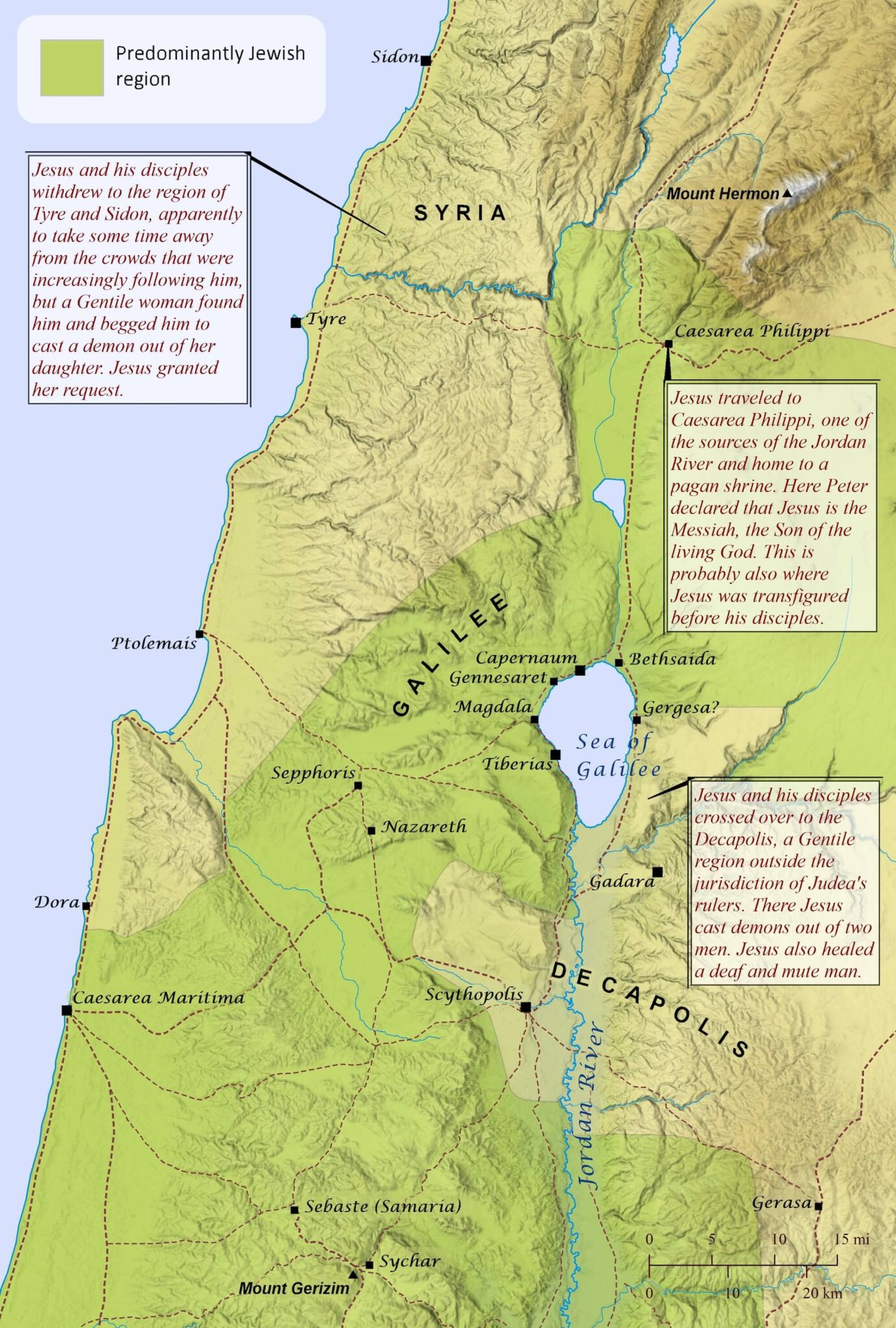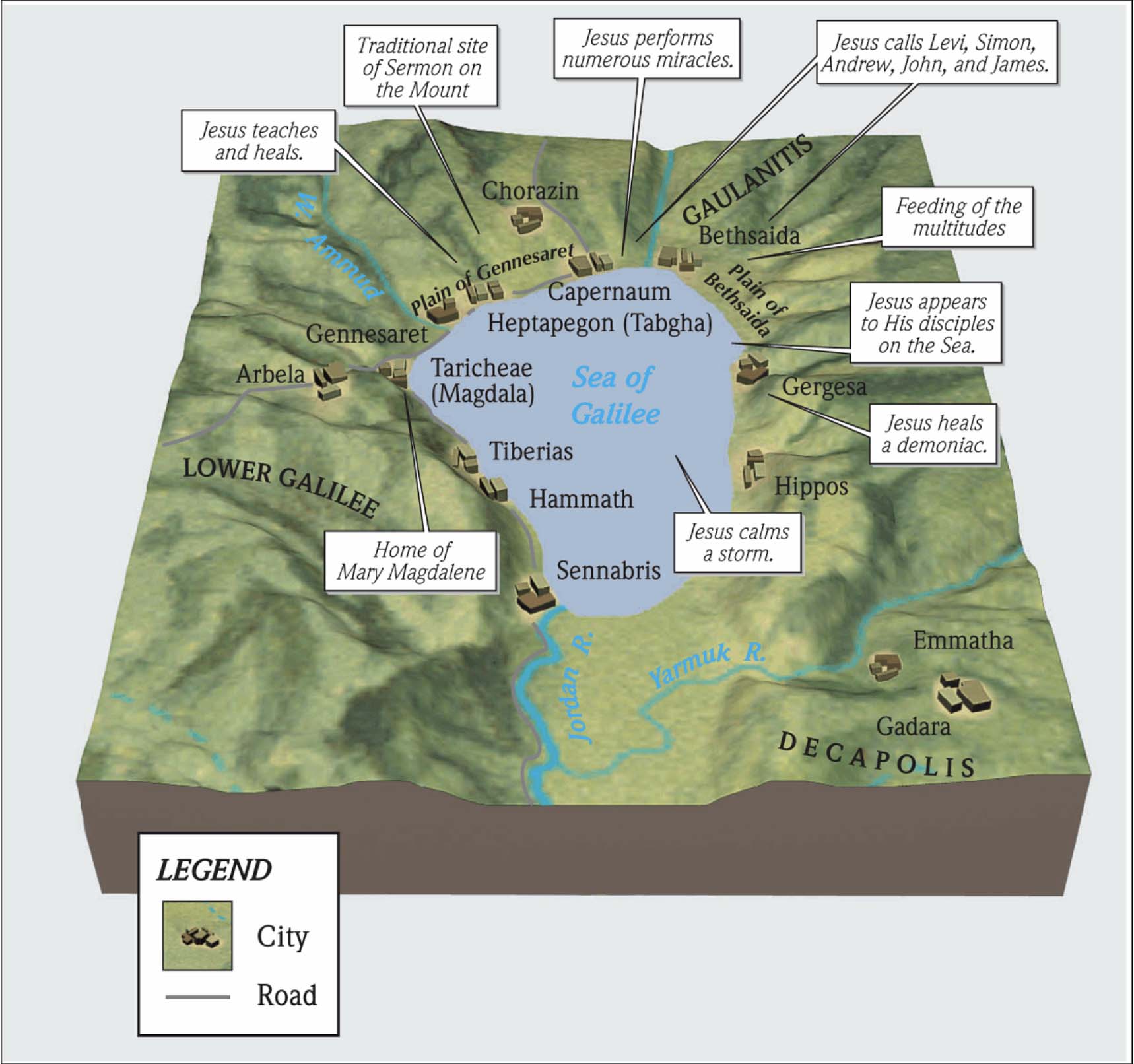Jesus returns to Capernaum, where He publicly and dramatically heals a paralytic. Before Jesus heals this man, He tells him that his sins are forgiven, which causes some of the scribes in the crowd to silently accuse Jesus of blasphemy in their hearts. Jesus calls out their blasphemous unbelief and demonstrates that He is Who He claims to be by healing the paralytic, telling him to get up and go home. Accordingly, the crowds are amazed that God has given this authority to men.
The parallel accounts of Matthew 9:1-8 are described in Mark 2:1-12, Mark 5:21, and Luke 5:17-26, Luke 8:40.
Jesus’s sojourn to the other side of the sea was brief. The Gadarene people living there begged Him to leave after He healed two demon-possessed men. Jesus had sent the demons into a herd of swine that then drowned itself, so the locals were afraid of and angry at Him. Jesus got into a boat and crossed back over the sea and came to His own city on the northern shore (v 1). Mark 2:1 confirms that His own city refers to the city of Capernaum where His ministry was headquartered along the northern shore of the sea, rather than the city of Nazareth, where He grew up. (See Mark 2:1-12 for a more detailed account of this episode.)
While Jesus was back in Capernaum, they brought to Him a paralytic lying on a bed (v 2). Mark tells us that they were four friends (Mark 2:1). The paralytic was unable to move, which was why they brought him on a bed (pallet). Matthew tells us that Jesus saw their faith. It is not entirely clear in this context who their includes. At a minimum it seems their refers to the they who brought the paralytic lying on a bed to Him, but it could include the paralytic that they brought as well (v 2). The faith that Jesus saw was their act of love and expression of hopeful belief.
Their faith was simple and remarkable. Their faith simple, in that they believed Jesus had the power to heal their friend. And their faith was remarkable, in that it required a degree of thoughtfulness, much effort, and ingenuity to place him on a bed and carry him to Jesus. They even had to cut a hole in the roof to get to Jesus because the crowds surrounding Him prevented them from coming near (Mark 2:2-4). Their faith demonstrated both belief and love and put those things into good action. Their faith displayed the “serve-first” lifestyle and righteousness that Jesus described when He delivered His kingdom platform in the Sermon on the Mount.
“In everything, therefore, treat people the same way you want them to treat you, for this is the Law and the Prophets.”
(Matthew 7:12)
They were serving their friend, who was physically unable to come to Jesus on his own, in the belief that He would heal him. Their faith in Jesus and love for their friend moved Jesus.
Jesus addresses the paralytic with a surprising and startling remark, Take courage (be cheerful), son; your sins are forgiven. This is surprising because the paralytic was brought to Jesus to be healed of his paralysis, not for Jesus to forgive his sins. The remark was also startling because the only people who could forgive a wrong would be someone injured by the paralytic and God Himself. The context strongly indicates that this was the first encounter between Jesus and this paralytic. In that case, there would have been no opportunity for the paralytic to have wronged Jesus and need forgiveness. By telling the paralytic, your sins are forgiven (v 5), Jesus is acting as though He is the chief party who has been offended by the paralytic’s sins. In other words, by making this statement, Jesus is speaking as though He is God.
This disturbed some of the scribes who were present and offended by Jesus’s remark. They thought to themselves, This fellow blasphemes. They rightly understood Who Jesus was presuming to be. When Jesus told the paralytic that his sins were forgiven, these scribes correctly perceived that Jesus was acting as though He were God. But at least some of these scribes did not believe that Jesus actually was God. The irony is that their evil thoughts accusing Jesus of blasphemy were themselves acts of blasphemy.
This is the first time in Matthew’s narrative that Jesus directly confronts religious leaders. As we recall, John (the Baptizer) did so earlier (Matthew 3:7-10) and Jesus only mentioned the scribes and Pharisees in a negative light when teaching His disciples during the Sermon on the Mount (Matthew 5:20). But up to this point, Matthew has not recorded Jesus challenging them in person. Though it is the first time, it will not be the last. Throughout this chapter, Matthew introduces the established religious authorities as the primary earthly opponents of Jesus’s kingdom message. It is not all the scribes, but some of the scribes. There will be leaders who believe in Jesus along the way, including Nicodemus and Joseph of Arimathea (John 3:1-2; Luke 23:50-51).
Even though some of the scribes did not believe that Jesus was God, they were wrong. Jesus was and is God. Jesus knew their thoughts. He understood the evil within their hearts that was driving their unbelief. He calls out the evil of their hearts’ unbelief. Jesus said to the unbelieving scribes, Why are you thinking evil in your hearts? (v 4). The word Matthew uses for thinking is “enthymeomai” (G1722) from which we get our term “enthymeme” (which is a form of logical syllogism). In His rhetorical remark, Jesus is accusing their hearts of silently “enthymeme-ing” or reasoning evil deductions about Him. Their evil thinking might have been something like this: “If Jesus is saying this, then He is claiming to be God, and He cannot be God because He does not fit our preconceived notions of God, therefore He is blaspheming.”
Jesus followed up this charge with another question. Which is easier, to say, ‘Your sins are forgiven,’ or to say, ‘Get up, and walk’? (v 5). They likely dared not answer Him out loud. From an earthly point of view, it is much easier to say to someone Your sins are forgiven than it is to tell a paralytic Get up, and walk (v 5). No one can measure whether forgiveness has occurred. You could claim it and no one could prove whether or not is has happened. It is therefore easier to say and claim that forgiveness has occurred. On the other hand, if someone says to a paralytic Get up, and walk, everyone will see rather quickly if healing has taken place, based on whether or not the paralytic can then walk. If the paralytic is healed, it proves that the person who told him to Get up, and walk had the power and authority to do so.
Jesus then tells the unbelieving scribes, But so that you may know that the Son of Man has authority on earth to forgive sins He heals the paralytic (v 6). Jesus makes clear that the healing of the paralytic is intended as a testimony to the scribes that Jesus does indeed have the authority on earth to forgive sins (v 6). Jesus then turns to the paralytic and says, Get up, pick up your bed and go home (v 6). Jesus offered them conclusive evidence of His power. Jesus made clear that seeing these works created a higher responsibility to believe (Matthew 11:21-23).
Christ demonstrates that He has the authority to forgive sins, that He is the Son of Man (v 6) (a common term meaning both “someone” as well as a biblical term for “the Messiah”), and that He is in fact God. Jesus demonstrates all of this by healing the paralyzed man so that he can walk home with his bed. Matthew then succinctly tells us, that the paralytic who was brought by his friends lying on a bed then got up and went home (v 7). This episode should have altered the evil thinking of the scribes. The scribes’ thinking or reasoning should have changed to something like, “Well this is clearly God’s power at work, so our preconceived notions must be wrong.” That appears to be the reaction of the crowds.
When the crowds of onlookers saw this take place, Matthew relates that they were awestruck (v 8). There is little doubt that they were amazed at the miracle that healed the paralytic. But their amazement was likely over more than just this miracle. They were probably amazed at the confrontation between Jesus and the unbelieving scribes. The scribes were established authorities who thought Jesus was a blasphemer. Jesus revealed the healing power of God, as well as the power to forgive sins. He scored an undeniable victory, while the scribes suffered humiliating defeat. But the crowds were also amazed, Matthew tells us, at God. Having seen the good works of Jesus and the paralytic’s friends, they glorified God, the Father in heaven. And they marveled at the fact that God had given such authority to men (v 8). The crowds may not have understood that Jesus was claiming to be God, as some of the scribes did, but they recognized and acknowledged what was obvious, that God was miraculously working through Him and had given this Man authority to heal incurable afflictions—and to forgive sins (v 6).
Biblical Text
1 Getting into a boat, Jesus crossed over the sea and came to His own city. 2 And they brought to Him a paralytic lying on a bed. Seeing their faith, Jesus said to the paralytic, “Take courage, son; your sins are forgiven.” 3 And some of the scribes said to themselves, “This fellow blasphemes.” 4 And Jesus knowing their thoughts said, “Why are you thinking evil in your hearts? 5 Which is easier, to say, ‘Your sins are forgiven,’ or to say, ‘Get up, and walk’? 6 But so that you may know that the Son of Man has authority on earth to forgive sins”—then He said to the paralytic, “Get up, pick up your bed and go home.” 7 And he got up and went home. 8 But when the crowds saw this, they were awestruck, and glorified God, who had given such authority to men.
Check out our other commentaries:
-
John 3:14-16 meaning
Jesus explains why He, God’s Messiah, has come to earth: He must die so that the world can receive eternal life. He compares himself to...... -
Genesis 25:23-26 meaning
God answers Rebekah’s inquiry and tells her that the turmoil indicates that her two sons within her will become two nations. The younger son and...... -
Matthew 13:31-32 meaning
Jesus compares the kingdom of heaven to a mustard seed that grows from a small seed into a large life-giving tree....... -
Joel 3:18-21 meaning
The LORD describes Judah’s final prosperity. He promises to restore their blessings and give them freedom from their enemies....... -
Deuteronomy 20:19-20 meaning
Moses asked the Israelites to protect the trees when they besiege a city. Non-fruit bearing trees could be cut down and used in building siegeworks,......





